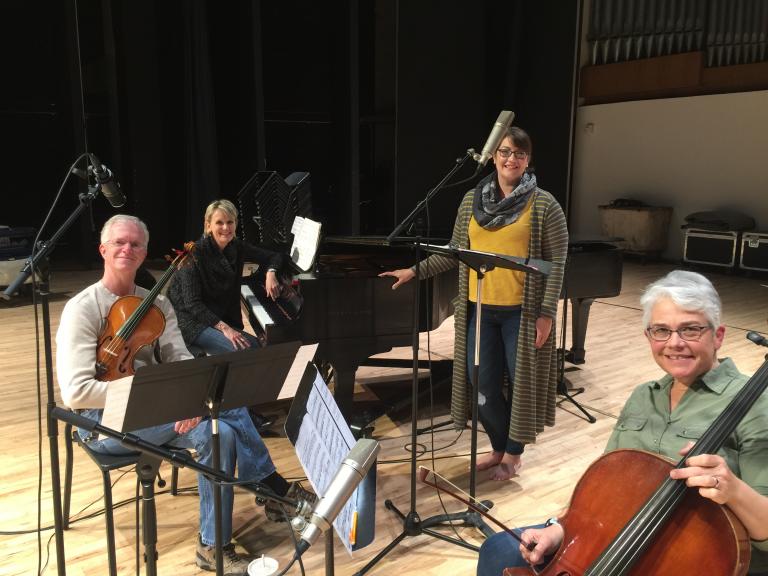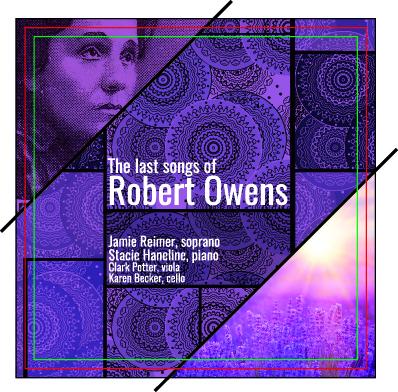
Reimer CD features The Last Songs of Robert Owens
calendar icon25 Feb 2021 user iconBy Kathe C. Andersen

Lincoln, Neb.--Associate Professor of Voice Jamie Reimer’s CD “The Last Songs of Robert Owens” will be released on March 19 by Centaur Records.
The CD is available for pre-order on Amazon at https://go.unl.edu/348o.
“This CD is a culmination of the songs for voice and piano and the chamber music for voice and strings (viola, cello and piano) that Robert Owens wrote at the end of his life,” Reimer said.
The songs included on the CD are the last pieces composed by Owens before his death in 2017. Reimer is joined on the CD by Stacie Haneline, piano; Clark Potter, viola; and Karen Becker, cello. Assistant Professor of Composition, Emerging Media and Digital Arts Tom Larson engineered the recording.
“Stacie and I have been playing together for over a decade. And to have the opportunity to work with Clark and Karen, who have been my friends and collaborators for years,” Reimer said. “This is the beauty of chamber music—to bring four people together with a common purpose and a common goal and share ideas—that’s the magic of music making. This CD is a product of a lot of really insightful, special, joyful collaboration, and that is a tremendous gift.”
Owens was born in the U.S. in 1925 and grew up in California. After serving in the military, he continued his musical studies in Paris at L’Ecole Normale de Musique under renowned pianist Alfred Cortot. After teaching in the U.S. for two years, he returned to Europe to live and work in Germany, where he was a composer, pianist and stage actor.
Reimer has been researching and performing Owens’ works since 2007. In August 2015, Reimer and the Glenn Korff School of Music presented the North American premiere of Owens’ opera titled “Culture! Culture!” He wrote the opera in Hamburg, Germany, in 1961 and premiered it in Ulm, Germany, in 1970.
Owens traveled to Lincoln in March 2015 to work with students and faculty on his music, but he was unable to make a return trip to see the opera performance that August. He died on Jan. 5, 2017.
Reimer said his music is eminently singable.
“His attention to text is unbelievable,” she said. “It doesn’t matter what poet he is setting. My first introduction to him was Langston Hughes. My dissertation was on the songs he set to Langston Hughes. That was the primary focus of my study and my performance for quite a while.”
The songs included on the CD include the song cycle for soprano and piano “4 Sonnets to Eleonora Duse,” with poetry by Sara Teasdale that were written for Reimer in 2012.
When they started talking about him composing for Reimer, she told him her favorite poet was Teasdale.
“I was so pleased when I saw them because he really did exactly what he said he did. He spent time with the poems, he got inside of the poems, and he created a musical environment for the text that brought it to life in a way that just words alone couldn’t do,” Reimer said. “It’s not always the easiest thing in the world to sing because of some of the intervals that he tends to favor, but when you hear it, it just makes sense. And I love that.”
Eleonora Duse was an Italian silent film actress, whose life was marred by tragedy.
“The keys that he chose are richer, darker, flat keys,” Reimer said. “And I think that color pervades the songs, but it doesn’t make them sad. He finds hope within the dark color that he chose, and he always really was fond of the dark color of my voice, so I think that is also partly why he chose to set them the way he did.”
Also included are three chamber music works: “The Mouse and the Camel,” “4 Songs for Mezzo Soprano and Viola” and “2 Songs for Mezzo Soprano and Cello,” set to the words of Persian poet Rumi.
“People keep going back to Rumi because he is so insightful about the condition of the human heart,” Reimer said. “And I think in this world where we are looking for simplicity and peace, Rumi is a great resource for that kind of mindful simplicity. In setting those, they really were the culmination of Robert as an artist, I think, because he was so attuned to words and to the condition of the human spirit. Everything that he says speaks to that in a very human way. The fact that the last works that he wrote were to the poetry of Rumi, I think is so fitting.”
Reimer said Owens also didn’t take himself too seriously.
“The larger chamber work that we did, ‘The Mouse and the Camel,’ is for mezzo, viola, cello and piano. And Robert’s sense of humor comes through in that piece, which I love,” Reimer said. “He has little musical motives that represent the mouse and represent the camel and the trek through the desert, and the relationship of the mouse, realizing that he might be faster, he might be smaller, he might be able to do all these things, but still having to respect what the camel contributes to that relationship. And I think that’s so brilliant.”
The final selection on the CD is Owens’ unpublished arrangement of “Amazing Grace,” which was discovered by Reimer during the retrieval of the composer’s manuscripts from Munich in 2016. The manuscripts for all the works on the CD now reside in the UNL Music Library’s digital resource, the Robert Owens Papers.
“I think the track that excites me the most on the CD is ‘Amazing Grace,’” Reimer said. “I found this little gem in a box when I was in Munich on a Hixson-Lied grant collecting all of his manuscripts. It’s a two-page setting of the traditional, American hymn. I haven’t seen him do anything else quite like this. I wish I would have known about it sooner because I would have loved to ask him why. He said that he was a spiritual man, but I didn’t ever feel like his spirituality was any sort of specific spirituality. It was surprising to me to find that piece.”
Reimer said the music of the piece is quintessentially Robert, and she’s thankful for the gift.
“The harmonies say ‘Robert,’ but it still is ‘Amazing Grace,’” Reimer said. “Having that at the end of what has been over a decade-long project for me with this man and his music and celebrating the gift that he gave to me and to the university through his visits and his manuscripts, it just seemed like the perfect bow on this lovely musical present to me.”
Reimer knows she has been fortunate to study the music of Owens over this past decade to give her insights into the music he composed.
“As a singer, my role is to bring to life the ink on the page,” Reimer said. “It’s such a fascinating partnership to be able to do that with a living composer because you can ask questions. I feel so fortunate to have worked with Robert and to know what he intended for each of these works. And now to be able to transfer that knowledge to my students and to other performers and scholars. I’m so thrilled to see that.”